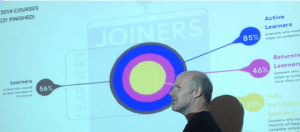Last month I attended a 3 day JISC Netskills workshop at Newcastle University entitled ‘e-learning Essentials’. Based on this particularly uninspiring title, I was prepared for the course to cover already well-trodden ground. However, I quickly found it to be the antithesis; within the first hour the unexpectedly inspiring trainer Danny McAtominey was making me think about e-learning in a way I had not considered in some time.
The course focussed heavily on learning theory and rationale with the first day spent entirely away from technology (in fact during the three days I did not learn about a single new tool or piece of software). We looked at educational taxonomies, instructional design cycles and pedagogical frameworks (the kind of diagrams I do not doubt we all have copies of but so rarely dig out and consult) and how these align with and inform course design.
So often it feels as though we are tagging technology onto current practice (technology enhanced learning?) and although this can (and does) positively impact teaching and learning, I can never help thinking that we are only really scratching the surface. Danny really helped to shift the focus away from the technology and a tool driven approach to the learning and course design. He put forward a very strong argument for scenario based, multi-disciplinary courses that put the online delivery on an equal footing with the classroom teaching.
Since attending the course I have been much more considerate and analytical when approaching even the most seemingly simple of requests from teaching staff; really thinking about the motivation behind using technology and how it may allow all types of learners to access higher levels of engagement.
In all, the course has at most changed the way I view e-learning or at least recalled to me a perspective I have held in the past (a little like being shown a photograph of a place you once visited). This being so, by the end of the course, I had revised my opinion and felt ‘e-learning Essentials’ was a wholly accurate description. I would therefore highly recommend it to even the most experienced practitioner, as much for the time it provides to reflect on e-learning in general, as for the content covered.
Please note, there are currently no workshops scheduled but I have been informed by JISC that there will be deliveries taking place at Euston and Newcastle later in the year and next year. More information can be found at e-Learning Essentials.
 Close
Close



